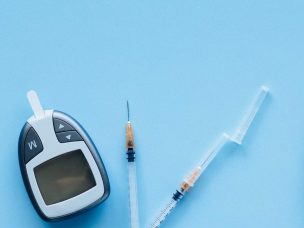Diabetes
Type 2 Diabetes Linked to Increased Risk for Colorectal Cancer
Greater associations seen for those without colonoscopy screening, with smoking history, and for recent diabetes diagnosis Type 2 diabetes is associated with an increased risk for colorectal cancer (CRC), with increased associations for those without colonoscopy screening and with smoking history, according to a study published online Nov. 14 in JAMA Network Open. ...
Dr. Greg Williams: Podiatry Education in Medical School
There should be a course, just on diabetic foot infections. Since diabetes is affecting the feet more than any other part of the body, we need to be able to correlate that as far as we’re dealing with diabetes, and what can happen as far as for eyesight, loss of vision, what can happen with...
Threshold of Diabetes Diagnosis May Be Too High for Women Under 50
Additional 17 percent of undiagnosed women aged younger than 50 years could be reclassified as having diabetes mellitus. Women aged younger than 50 years have a markedly lower hemoglobin A1c (HbA1c) distribution than men, according to a study published online Sept. 30 in Diabetes Therapy to coincide with the annual meeting of the European Association for the...
Once-Weekly Insulin Icodec Superior for HbA1c in Type 2 Diabetes
Icodec with app superior to once-daily basal insulin analogues for change in glycated hemoglobin For insulin-naive adults with type 2 diabetes, once-weekly insulin icodec (icodec) titrated with a dosing guide app (icodec with app) is superior for change in glycated hemoglobin A1c (HbA1c) level versus once-daily basal insulin analogues (OD analogues), according to a study...
Hemoglobin Glycation Index Linked to NAFLD in Patients With Diabetes
A recent study confirms the link between higher hemoglobin glycation index levels and the risk of developing non-alcoholic fatty liver disease in patients with type 2 diabetes. For healthcare providers, understanding this association may offer a novel avenue for identifying patients at higher risk for liver disease. Higher hemoglobin glycation index levels were significantly associated...
Gender Disparities in Metformin Treatment for Type 2 Diabetes Uncovered
New insights into how men and women differ in metformin treatment patterns for type 2 diabetes suggest opportunities for personalized treatment strategies. These findings could potentially lead to more effective dosing regimens and management plans that take into account the unique physiological characteristics of each gender. A recent study of 11,508 metformin initiators, of whom...
Perspectives on a Novel Diabetes Self-Management Program for African Americans
Medically reviewed by Dr. Shani Saks, D.O. on Sept. 7, 2023 This study determined that a novel culturally tailored program for the management of diabetes fulfilled the needs of African American patients and stakeholders. The study also identified several acceptance and logistical organizational barriers that need to be addressed. The engagement of stakeholders in the implementation...
Sleep Hygiene and Sleep Quality in Uncontrolled Type 2 Diabetes
Medically reviewed by Dr. Shani Saks, D.O. on Sept. 12, 2023 Sleep quality was moderately associated with sleep-related impairment in sleep hygiene practices in Latinx and Black adults with uncontrolled type 2 diabetes, as measured by the Sleep Hygiene Practices Scale. Sleep quality and duration have been identified as modifiable risk factors that contribute to poor glycemic...
Gut Microbiota and Pancreatic Function Outcomes With Polyphenol Rutin Intervention
Medically reviewed by Dr. Shani Saks, D.O. on Sept. 12, 2023 Rutin supplementation did not yield significant changes in the response of pancreatic ß-cells to an oral glucose tolerance test or in the gut microbial composition in a randomized controlled trial. Prebiotic polyphenol rutin is a potential dietary supplement for the prevention of type 2 diabetes in...
More Medical News














